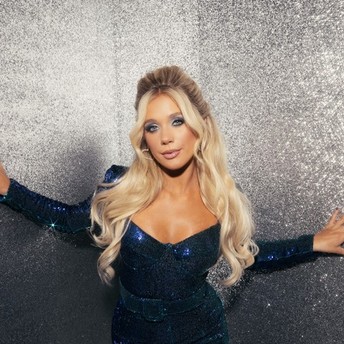News
Page: 109
Trending on Billboard Katy Perry got some new ink in honor of The Lifetimes Tour, which has just eight shows left before wrapping up. The pop star continued her tradition of getting a tattoo to commemorate each of her tours, showing off her butterfly wing tattoos that she and her team got in an Instagram […]
Trending on Billboard
Barry Manilow released a new video on Tuesday (Nov. 11) for his new single “Once Before I Go.” In the video, Manilow portrays a character who sacrifices a traditional family life to pursue his dream as a performer. Filmed at the Westgate Las Vegas Resort & Casino, home to Manilow’s long-running residency, the video was directed by Jamie Thraves, who has helmed such clips as Sam Smith’s “Stay With Me” and Coldplay’s “The Scientist.”
Thraves’ video for “The Scientist” received a Grammy nomination for best short-form music video 22 years ago. Manilow has received 15 Grammy nominations, winning best pop vocal performance, male in 1979 for “Copacabana (at the Copa).” He also received record of the year nods for “Mandy” and “I Write the Songs” and an album of the year nod for Even Now.
Manilow’s first video with a narrative storyline was “Read ‘Em and Weep” in 1983, when video ruled the music business. Bob Giraldi directed the clip.
“Once Before I Go” was coproduced by Kenneth “Babyface” Edmonds and Demonte Posey, and cowritten by Peter Allen and Dean Pitchford. The song was first recorded by Allen in 1983 on his album Not the Boy Next Door. Other artists who have covered it include Patti LaBelle, Hugh Jackman (in the Broadway show The Boy From Oz) and Johnny Mathis (on his most recent non-holiday studio album, Johnny Mathis Sings the Great New American Songbook – which was also produced by Babyface).
Manilow has had two No. 1 albums on the Billboard 200, nearly 30 years apart – Barry Manilow Live! (1977) and The Greatest Songs of the Fifties (2006). He has had three No. 1 hits on the Hot 100 – “Mandy,” “I Write the Songs” and “Looks Like We Made It.” Manilow has won two Primetime Emmys, a Grammy and an honorary Tony. He was elected to the Songwriters Hall of Fame in 2002 and has received the BMI Icon Award.
In April 2026, Manilow will be presented with the American Advertising Federation’s 2026 President’s Award at the AAF’s Advertising Hall of Fame induction ceremony for his early work in advertising. Manilow has produced, composed, and performed some of the most iconic commercial jingles of all time for companies and brands such as State Farm, Band-Aid, KFC, Pepsi and McDonald’s.
The new music video arrives as Manilow prepares for a series of farewell performances in nine U.S. cities this January. These dates mark his final concerts in each market. For all dates, tickets, and VIP packages, visit Manilow’s site.
Watch Manilow’s video below:
Trending on Billboard What better way to celebrate a historic Rock & Roll Hall of Fame induction than grooving down the Jennifer Hudson Show spirit tunnel? On Tuesday (Nov. 11), Grammy-winning hip-hop group Salt-N-Pepa visited Hudson’s talk show to reflect on more than three decades of boundary-obliterating moves. From reclaiming their masters (which they alluded […]
All products and services featured are independently chosen by editors. However, Billboard may receive a commission on orders placed through its retail links, and the retailer may receive certain auditable data for accounting purposes.
Ever since the Los Angeles Lakers acquired all-star Luka Doncic in a trade with the Dallas Mavericks last season, there has been a new spark and energy for the team. Although Oklahoma City is considered the favorite to win the NBA Finals again, the new-look Lakers may give the Thunder some trouble repeating on the court.
Explore
See latest videos, charts and news
The Los Angeles Lakers take on the Oklahoma City Thunder at Paycom Center in Oklahoma City, Oklahoma on Wednesday, Nov. 12. This game could be a preview of the Western Conference Finals this season, with the Lakers and Thunder expected to lead the pack in the west.
When Does L.A. Lakers vs. Oklahoma City Thunder Game Start?
L.A. Lakers vs. Oklahoma City Thunder game broadcasts live, with tipoff at 9:30 p.m. ET/6:30 p.m. PT.
Where to Watch L.A. Lakers vs. Oklahoma City Thunder Online
L.A. Lakers vs. Oklahoma City Thunder game broadcasts on ESPN, and it’s also livestreams on Sling Orange. Keep reading for more details on how cord-cutters can watch the Lakers-Thunder game online with Sling TV.
How to Watch L.A. Lakers vs. Oklahoma City Thunder With Sling TV
A subscription to Sling Orange, which comes with ESPN, gets you access to live TV from popular cable channels.
You can watch cable networks, including ESPN2, ESPN3, Disney Channel, Freeform, MotorTrend, A&E, AMC, BBC America, BET, CNN, Comedy Central, Food Network, Fuse, HGTV, History Channel, IFC, Lifetime, Nick Jr., QVC, TBS, TNT, Travel Channel, Vice and many others.
Please note: Prices and channel availability depends on your local TV market. You can learn more about Sling TV here.
Which Celebrities Are Making Appearances During Lakers vs. Thunder?
It’s likely there will be a number of celebrities and recording artists in attendance during Wednesday night’s game — such as L.A. Lakers fans Snoop Dogg, Ice Cube, Flea, Anthony Kiedis, Kendrick Lamar and others; as well as Oklahoma City Thunder fans Kristin Chenoweth, Bill Hader, Olivia Munn, Hanson and others. Tune in to Sling TV to find out who’s sitting courtside on celebrity row.
Starting at 9:30 p.m. ET/6:30 p.m. PT, L.A. Lakers vs. Oklahoma City Thunder broadcast on ESPN, while it’s also available to livestream on Sling TV on Wednesday, Nov. 12.
Want more? For more product recommendations, check out our roundups of the best Xbox deals, studio headphones and Nintendo Switch accessories.
Source: Cooper Neill / Getty
Antonio Brown, who is facing a second-degree attempted murder charge, had his lawyer enter a not guilty plea on his behalf as Brown is still in New Jersey after being extradited from the United Arab Emirates.
Brown was arrested and returned to the United States last week. It’s unclear why or how long Brown will be detained in New Jersey and when he will be sent to South Florida to stand trial, Yahoo Sports reports.
The charges stem from an incident that occurred after a celebrity boxing event earlier this year.
“The actions he was forced to take were solely in self-defense against the alleged victim’s violent behavior,” Brown’s lawyer, Mark Eiglarsh, told TMZ. “Brown was attacked that night and acted within his legal right to protect himself from an individual who had previously committed criminal acts against him. It’s a privilege to represent him, and I am determined to ensure that justice is served.”
Love Hip-Hop Wired? Get more! Join the Hip-Hop Wired Newsletter
We care about your data. See our privacy policy.
Footage of the reported incident was promptly shared on social media. The video appears to show Brown leaving the event when he is approached by several men. A melee ensues, and moments later, gunshots can be heard as the crowd scatters.
Police initially detained Brown, but he was released. Shortly after his release, Brown took to social media to claim that the alleged incident was “self-defense.”
“I was jumped by multiple individuals who tried to steal my jewelry and cause physical harm to me,” he wrote on his X account. “Contrary to some video circulating, Police temporarily detained me until they received my side of the story and then released me. I WENT HOME THAT NIGHT AND WAS NOT ARRESTED. I will be talking to my legal council [sic] and attorneys on pressing charges on the individuals that jumped me.”
Witnesses claimed that Brown was the shooter during the incident. Police did not find a weapon on Brown when they arrived. A man, who was reportedly punched by Brown, claimed that the former Pittsburgh Steelers receiver “began to run toward him with a firearm” and opened fire twice, Yahoo Sports reports.
An arrest warrant was issued for Brown in June. If convicted, Brown faces up to 15 years in prison.
See social media’s ongoing reaction to the arrest below.
“I Was Jumped!” Antonio Brown Pleads Not Guilty In Attempted Murder Case
was originally published on
cassiuslife.com
Source: Chad Salvador / Getty
Omarion isn’t holding back after Mario made some questionable comments about his singing ability.
Mario recently made an appearance on Cam Newton’s podcast and put the whole R&B game on notice. Ranking who can sing and who can SANG. Big difference here.
Some singers mentioned were Bryson Tiller, Chris Brown, The Weeknd, & more. The critique that stood out the most came from the Baltimore singer, who had some things to say about Omarion’s voice: “Omarion, it be hit or miss for me sometimes.”
Maybach O wasn’t feeling that comment at all.
Recently, the Ice Box singer pulled up on Sway to talk about new music. The conversation also touched on Mario’s comments about his singing ability and whether the two could collaborate again.
Love Hip-Hop Wired? Get more! Join the Hip-Hop Wired Newsletter
We care about your data. See our privacy policy.
“I’m not sure, I don’t think so. I think that, for me, it’s all about respect. I think you can have your opinion, but the moment I feel like there’s no respect there, I’m cool. I’d rather step back. I don’t think there’s respect there, especially for somebody like me who has been doing it before him… It’s not by chance, it’s by hard work.”
Also adding his two cents on the overall singing ability conversation across the board, “Which is a wild conversation, becasue we’re supposed to be here to uplift.”
Jacquees, or in other words, the self-proclaimed King of R&B, also wasn’t feeling Mario’s comments about his singing ability. He came at the Just A Friend singer and gave Cam Newton a piece of his mind, “Cam Newton & Mario some h*es, keep my name out y’all mouth on dat lil podcast…I been minding my business.”
Trending on Billboard
Megan Moroney is trading the deep blue tones that accented her album Am I Okay? with the lush, cotton candy pink hues that are ushering in her new album, Cloud 9, set to release Feb. 20, 2026.
Explore
See latest videos, charts and news
“It’s a long way down,” Moroney said on Instagram when announcing the new album. She also shared the angelic cover artwork of the project, which features the singer standing on a ladder and dressed in a vivid pink gown with a train that blends with the pink-tinted clouds that surround her.
According to that announcement, the album will have three sides and appears to have 15 total tracks, among them the title track (“Cloud 9”) as well as “6 Months Later” and “Beautiful Things.”
Earlier this year, “6 Months Later” reached the top 30 on the all-genre Billboard Hot 100, and has reached the top 10 on the Hot Country Songs chart.
“I am so excited for my fans and I to dive into this new world of Cloud 9 together,” Moroney said in a statement. “Similar to the first two albums, it’s all written about honest, personal experiences, but these songs were written by the strongest, most confident version of myself I’ve ever been. My feet feel firmly planted in my artistry and it was fun to play around sonically, while still sticking to my roots of what my fans and I love. Cloud 9 is a state of mind, and I have no doubt this will be the best chapter yet.”
Ahead, Moroney is gearing up to perform at the 59th annual CMA Awards, where she is tied for the leading amount of nominations. She is the reigning CMA new artist of the year, and heading into this year’s ceremony, the musician is up for single of the year and song of the year (both for “Am I Okay?”), as well as album of the year (Am I Okay?), female vocalist of the year, musical event of the year (for “You Had to Be There” with Kenny Chesney) and music video of the year (for the video for “Am I Okay?”).
See Moroney’s Cloud 9 album cover below:
Megan Moroney, “Cloud Nine”
Amber Asaly
Trending on Billboard Kodak Black is collaborating with the music discovery platform Audius to launch a new artist coin. Timed to Yak’s annual Kodak Day celebration in his hometown of Pompano Beach, Fla., the rapper will distribute the artist coin, called $YAK. $YAK holders will be able to access unreleased music, stems and other behind-the-scenes […]

Trending on Billboard Beliebers and ENGENE, unite! ENHYPEN is getting hyped up for the holidays with a festive cover of Justin Bieber‘s enduring seasonal hit, “Mistletoe,” which the K-pop boy band released exclusively through Apple Music on Tuesday (Nov. 11). The rendition of the Biebs’ 2011 classic — which reached No. 11 on the Billboard […]
Trending on Billboard Sony Music reported record-high quarterly earnings on Tuesday and its Tokyo-based parent company raised its overall annual earnings forecast, as rising streaming income and the success of the anime series Demon Slayer: Kimetsu no Yaiba Infinity Castle made the music segment a standout success for the Japanese conglomerate. Overall sales for Sony […]

 State Champ Radio
State Champ Radio 






